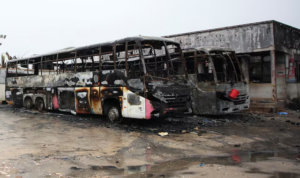Madagascar’s political crisis deepened this week as Colonel Michael Randrianirina, leader of a recent coup, declared he would be legally sworn in as the country’s new president on Friday. The announcement was made just a week after the African Union suspended Madagascar’s membership for an unconstitutional coup against President Andry Rajoelina.
The AU’s decision follows mounting world concern with the island nation’s latest drift toward military dictatorship — a familiar refrain in Madagascar’s strife-torn political history.
????️ “Colonel Michael Randrianirina will be sworn in as President of the Refoundation of the Republic of Madagascar in a solemn hearing,” his office announced late Wednesday, affirming the High Constitutional Court will administer the oath.
???? What Went Down

On the weekend, President Rajoelina fled the nation amid growing anti-government protests, most of which were inspired by young protesters unhappy with his administration. Parliamentarians retaliated by impeaching him in absentia, which in effect brought an end to his term.
But Rajoelina has not taken this lying down — he has spurned the military coup and insists that he remains the rightful president. For all his tantrums, his political support appears to be melting away, with large-scale defections by the military and security forces, many of whom have joined the people.
Enter Colonel Randrianirina — a top officer in the élite CAPSAT brigade, a man who was implicated in the 2009 coup which originally installed Rajoelina in power. Now, 16 years on, Randrianirina has defected and seized control for himself.
⚠️ African Union Acts Faster
The African Union (AU) wasted no time in condemning the coup, suspending Madagascar’s membership on Wednesday and demanding a return to civilian-led government and free elections.
????️ “From now on, there will be behind-the-scenes negotiations,” Randrianirina said during a press conference Thursday. “We’ll see how things unfold.”
But AU suspension is no trivial matter — it can cut a country off from essential political and economic aid, and sends a strong signal to other countries watching closely.
????️ Military Announces Transition Plan
Colonel Randrianina has promised that the army never wants to stay in power forever.
He says that an interim administration will run the country for up to two years, where the military will work with the National Assembly (the only body not abolished in the coup) to stabilize the country and finally hold new elections.
No election date has been set yet — an element many critics view as cause for concern.
???? A Nation in Deep Trouble

Madagascar’s most recent mayhem is unfolding against a dark background:
The country has approximately 30 million citizens, with a median age of below 20 years — one of the youngest in the world.
Of those, nearly 75% exist in poverty, according to the World Bank.
Since it gained independence in 1960, Madagascar’s per capita GDP has declined by nearly 45%.
With these bleak economic times and few prospects for a job, young people — particularly the Gen Z generation — have cried loudest for change.
Young people have been at the center of the protests driving Rajoelina out of power, with the anger not just with leadership but also with an entire system that seems to offer no hope for the future.
???? What’s Next?
As Colonel Randrianirina makes the leap to office, the world waits and watches.
Will the other international players and the AU create an account with his promises of a temporary transition? Or will they insist on convincing Madagascar with stronger measures — sanctions or reductions in aid — to steer it back towards democratic standards?
And most of all, will this leadership switch ever improve daily life for regular Malagasy people?
The next few weeks will be critical to ascertain whether this coup marks the beginning of true reform — or just another chapter in Madagascar’s long saga of political instability.
Stay tuned.




